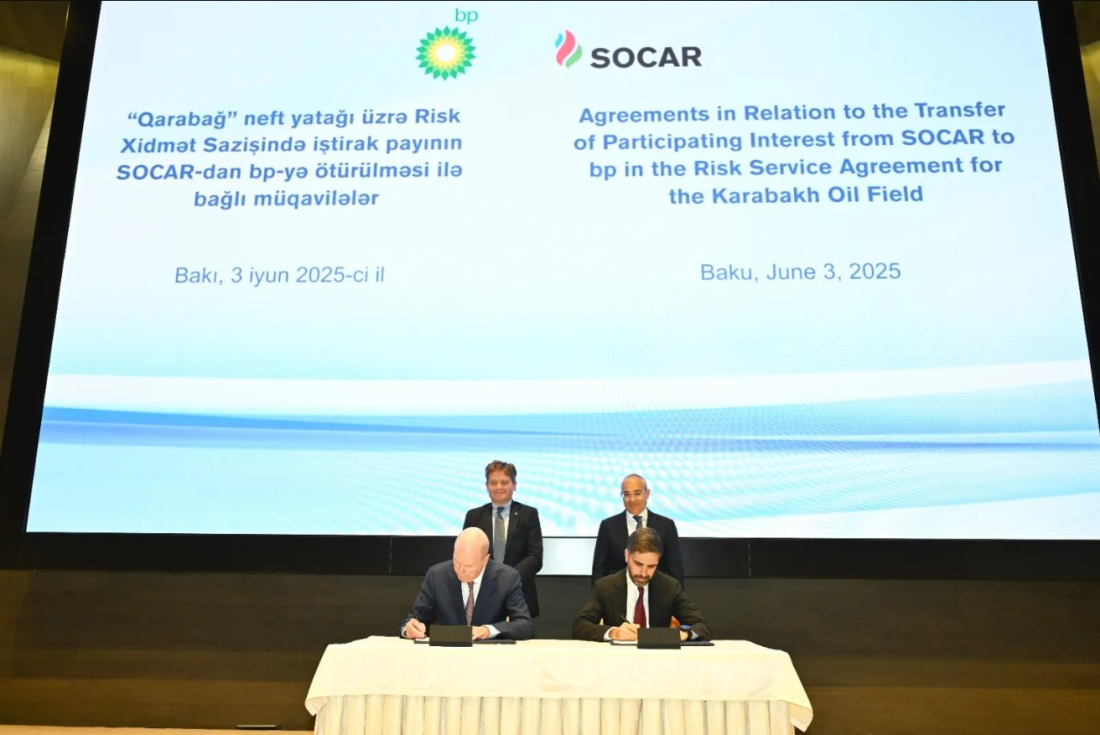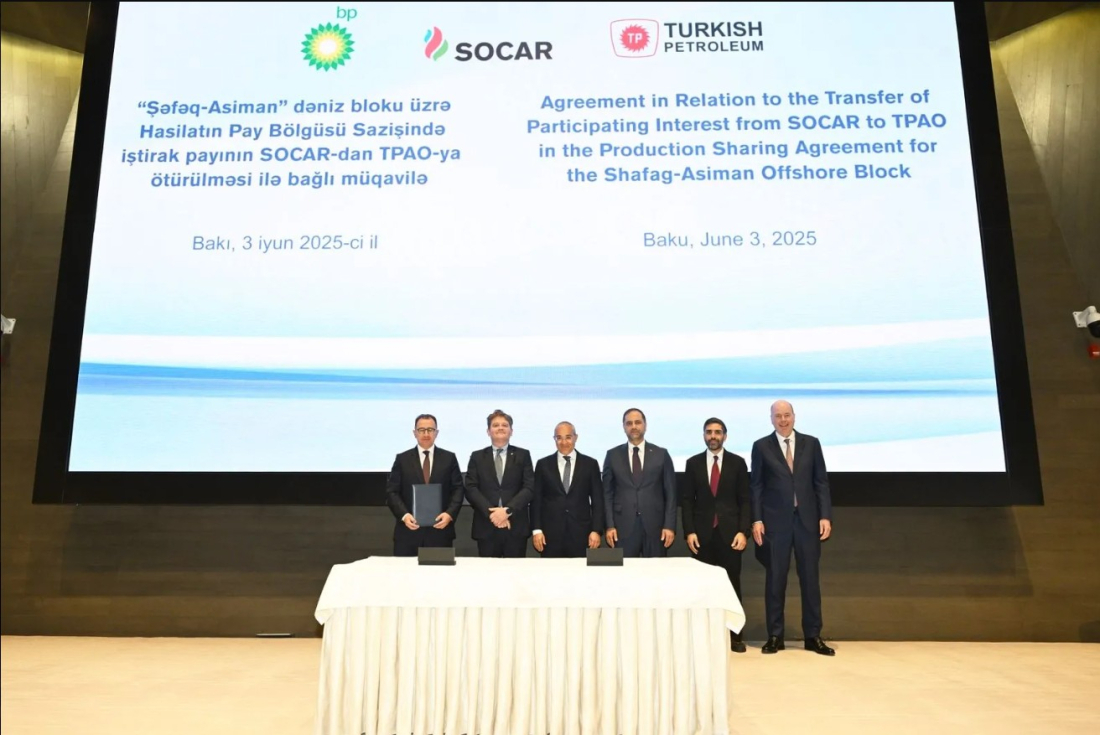Sumud Flotilla activists deported from Israel arrive in Slovakia
Participants in the Sumud Flotilla have arrived in Slovakia after being deported from Israel, following their attempt to deliver aid to Gaza....
bp, in collaboration with its partners, has signed a series of agreements to strengthen and expand its significant oil and gas interests in Azerbaijan.
The agreements, signed during Baku Energy Week, include the final investment decisions for the next major phase of development of the giant Shah Deniz gas field – Shah Deniz Compression – as well as for two projects – for terminal electrification and solar power – that together are expected to enable operational emissions reduction. They also include agreements for bp to access to two new exploration and development licences and introduce a new partner to accelerate exploration on a third.
bp said that these agreements represent progress against company’s strategy to grow long-term shareholder value, contributing to its goal of growing its upstream business, as well as underlining bp’s continuing commitment to Azerbaijan.
These projects are fully accommodated within bp’s financial frame. Shah Deniz Compression is one of the 8-10 major projects expected to start up between 2028 and 2030, as disclosed at bp’s 2025 capital markets update. It is expected to contribute to growing bp’s global upstream production to 2.3-2.5mmboed by 2030, with capacity to increase further to 2035.
Gordon Birrell, EVP production & operations, stated that "as we deliver our strategy of growing our upstream, we will build on our strong positions in regions like Azerbaijan, and on the deep relationships we have with the government and our partners."
“The next phase of development for Shah Deniz – a truly world-class gas field – will access additional resources, extend production and support continued delivery of important gas supplies to European customers. Innovative linked electrification and solar projects will support lower operational emissions in Azerbaijan while freeing up fuel gas for export. And we look forward to working with SOCAR and TPAO to progress exploration for further opportunities,” - he said in the company's statement.
Shah Deniz Compression project
bp and partners have approved the next phase of development of the Shah Deniz gas field, which is operated by bp with a 29.999% participating interest.
The $2.9bn Shah Deniz Compression project – the field’s third phase of development – is designed to access and produce low pressure gas resources from the giant gas field, increasing resource recovery and extending production life.
The project, which will include installation of a new unmanned compression platform, is expected to allow production of an additional gross 50 billion cubic metres of gas and 25 million barrels of condensate. The project is expected to receive first gas in 2029. Shafag solar and Sangachal electrification projects
bp and partners have also given the go-ahead for development of the linked Shafag solar and Sangachal terminal electrification projects.
Renewable electricity generated by the new 240MW Shafag solar project in Azerbaijan’s Jabrayil district will be supplied to grid operator AzerEnerji, that will in turn provide equivalent power to the Sangachal oil and gas terminal (operated by bp) near Baku.
This will support reduction of operational emissions in Azerbaijan, enabled by the electrification of the terminal, which will also free for export the gas currently used to fuel the turbines generating power for the terminal.
Exploration access and progress
In addition to the project approvals, bp today completed an agreement with SOCAR to access two blocks in the Caspian Sea for exploration and development, for the discovered Karabagh oil field and the Ashrafi-Dan Ulduzu-Aypara (ADUA) area. bp will have 35% working interest and become operator of each block, with SOCAR retaining 65%.

Separately, bp and SOCAR also reached agreement for Türkiye’s TPAO to take a 30% interest in the production sharing agreement for the Shafag-Asiman block in the Caspian Sea. This is expected to accelerate evaluation of development opportunities for the block, on which a first well drilled in 2021 encountered gas condensate resources.

These agreements are part of bp’s strategy of accessing discovered resources and reloading its exploration hopper in support of its aim to increase its reserves replacement ratio to around 100% by end 2027.
Video from the USGS (United States Geological Survey) showed on Friday (19 September) the Kilauea volcano in Hawaii erupting and spewing lava.
At least eight people have died and more than 90 others were injured following a catastrophic gas tanker explosion on a major highway in Mexico City’s Iztapalapa district on Wednesday, authorities confirmed.
At least 69 people have died and almost 150 injured following a powerful 6.9-magnitude earthquake off the coast of Cebu City in the central Visayas region of the Philippines, officials said, making it one of the country’s deadliest disasters this year.
A powerful 7.4-magnitude earthquake struck off Russia’s Kamchatka Peninsula on 13 September with no tsunami threat, coming just weeks after the region endured a devastating 8.8-magnitude quake — the strongest since 1952.
Authorities in California have identified the dismembered body discovered in a Tesla registered to singer D4vd as 15-year-old Celeste Rivas Hernandez, who had been missing from Lake Elsinore since April 2024.
The currency swap agreement signed between the central banks of Türkiye and the United Arab Emirates (UAE) is set to strengthen Türkiye’s digital banking sector and attract fresh investment from the Gulf.
Shein is opening its first permanent physical stores in France, starting in Paris and expanding to five more cities. The fast-fashion giant aims to test brick-and-mortar retail in one of the world’s most influential fashion markets.
Tesla sales hit a record 497,099 vehicles in Q3 as buyers rushed before the U.S. tax credit expired according to reports. Despite the surge, experts warn the gains may not last amid rising competition.
American soybean farmers are struggling as China, once their largest buyer, shifts purchases to Argentina amid trade tensions and export incentives.
U.S.-based aviation company Boeing is preparing to produce a new narrow-body, single-aisle aircraft to replace its 737 Max model, sources report.
You can download the AnewZ application from Play Store and the App Store.

What is your opinion on this topic?
Leave the first comment